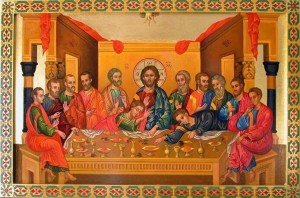The Eucharist, or Holy Communion, is the center of our worship. We often refer to ourselves as a “Eucharistic community” meaning that all believers gather in unity at the Lord’s Table. The Eucharist is more than just a ritual, it is a divine mystery. Our Church believes that the real presence of Christ is in the consecrated bread and wine.
To understand our perspective on Holy Communion, it is important to compare our views with those of other churches. For example, the Roman Catholic Church uses the term “transubstantiation” to describe its understanding of what happens to the bread and wine during the Eucharist. According to this view, the bread and the wine are literally changed into the body and blood of Jesus Christ. As for the bread, as bread, and the wine, as wine, nothing remains after the prayers of consecration, not even a morsel. It only looks like bread and wine. In reality it was the Body and Blood of Christ.
Our Church’s perspective is slightly different. We believe that the Eucharist is indeed a mystery and that the bread and wine are really transformed into the Body and Blood of Christ. However, we do not attempt to explain exactly how this happens. Our Church doesn’t mind letting a mystery remain a mystery. We know that the Lord Jesus Himself commanded us to eat his body and drink his blood, and we know that by doing so we are nourished spiritually. We accept this by faith and don’t attempt to describe how this is accomplished other than to say that sometime during our prayers to the Father, Son and Spirit, the mystery becomes complete.
The word Eucharist literally means thanksgiving. It is a meal in which we call forth (anamnesis) the death, burial, and resurrection of Christ. In our Church Holy Communion is the climax of our worship. We pray to the Father to send down His Holy Spirit upon the bread and the wine (epiclesis), and also upon his people. When we enter into this sacred act, we are transformed by the Holy Spirit just as the bread and wine are changed. This beautiful mystery cannot be explained by words or theological precision. It is something which must be experienced by those who have joined their lives in Christ.
The Orthodox view of Holy Communion is often misunderstood by other Christians, particularly Protestants. Since the reformation, many Christians have reacted strongly against some of the medieval practices of the Roman Catholic Church. Holy Communion is often perceived as a “work” to attain righteousness. However, this has never been the view of the Orthodox Church. We understand the Eucharist to be a reaffirmation of Christ’s atoning work on the cross.
Another point of confusion is the term “sacrifice.” By using the word sacrifice, we do not mean that Jesus is sacrificed again and again as some understand. Orthodoxy agrees with scripture which declares that Jesus’ crucifixion was a sacrifice “once and for all.” Each time we celebrate the Eucharist (thanksgiving) we are The word “Eucharist” literally means thanksgiving. It is a meal in which we call forth (anamnesis) the death, burial, and resurrection of Christ. In our churches Holy Communion is the climax of our worship. We pray to the Father to send down His Holy Spirit upon the bread and the wine (epiclesis), and also upon his people. When we enter into this sacred act, we are transformed by the Holy Spirit just as the bread and wine are changed. This beautiful mystery cannon be explained by words or theological precision. It is something which must be experienced by those who have hidden their lives in Christ.
The Orthodox view of Holy Communion is often misunderstood by other Christians, particularly Protestants. Since the reformation, many Christians have reacted strongly against some of the medieval practices of the Roman Catholic Church. Holy Communion is often perceived as a “work” to attain righteousness. However, this has never been the view of the Orthodox Church. We understand the Eucharist to be a reaffirmation of Christ’s atoning work on the cross.
Another point of confusion is the term “sacrifice.” By using the word sacrifice, we do not mean that Jesus is sacrificed again and again as some understand. Orthodoxy agrees with scripture which declares that Jesus’ crucifixion was a sacrifice “once and for all.” Each time we celebrate the Eucharist (thanksgiving) we are offering back to the Father the sacrifice of His Son Jesus Christ. It is truly a sacrifice of praise.
The Eucharist and the Orthodox Understanding of Time. We uphold the ancient teaching that at the Lord’s Table, we return to that very moment itself. Obviously our perspective is more than just a symbolic remembrance, but beyond this definition of mystery we cannot go. The Eucharist is called the “mystical supper,” and those who truly believe received the transforming power of the body and blood of Christ.

